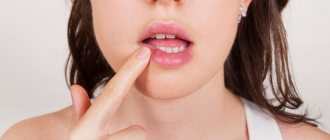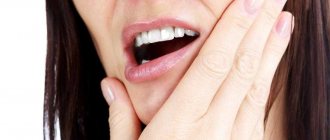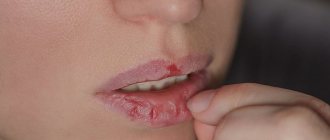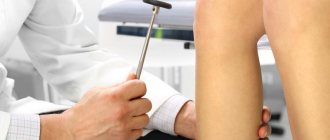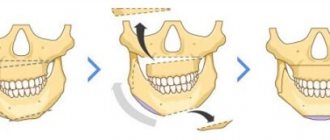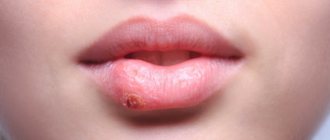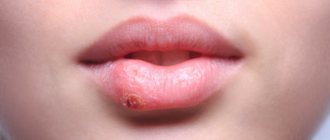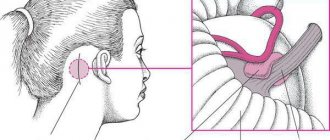- Physiological reasons
- Dental reasons
- Paresthesia of the lips due to damage or inflammation of the trigeminal nerve
- Numbness due to migraine with aura
- Numb lips due to stroke
- Numb lips due to diabetes
- Numb lips due to allergies
- Shingles
- Neuroses and multiple sclerosis
- Anemia
- Diagnosis and treatment
Lip paresthesia (numbness) is a condition in which tissue sensitivity decreases or disappears.
This process may be accompanied by tingling or other sensations. Numbness of the lips occurs for physiological reasons and is one of the symptoms of a certain pathology. First of all, it is necessary to pay attention to the frequency of occurrence and duration of this condition, its spread to other parts of the face and body. Lips may go numb in people who suffer from neurological and dental diseases, diabetes, anemia, allergies and a number of other diseases. If the symptom occurs frequently, an examination by a dentist and neurologist is recommended to determine the exact cause of the numbness.
Physiological reasons
Tissue sensitivity may decrease upon contact with very hot or cold food or drinks. This happens when a person eats ice cream, drinks tea or coffee that is too hot, or eats too spicy food. A similar phenomenon is observed outside in cold weather. The skin of the lips becomes chapped, cracks appear, and sensitivity decreases. Physiological numbness in most cases does not cause harm to health. As soon as contact with the irritant ceases, tissue sensitivity is restored.
To avoid the negative consequences of low-temperature exposure, you should use lipsticks and balms that will protect the skin from chapping and painful cracks.
Another possible cause of tissue numbness is cosmetic and cosmetic procedures. For example, lip products with red pepper extract may cause a slight burning sensation or numbness of the tissues. Some women experience a decrease in lip sensitivity after tattooing if the procedure was performed incorrectly or the wrong lip care was chosen after it.
Numbness after implantation
One of the most common reasons for decreased sensitivity of the dentition is a violation of the implantation technique, that is, the implantation of an artificial tooth root. The situation can also be aggravated by the introduction of poor-quality anesthesia or nerve damage during an injection with a syringe with an anesthetic composition.
Numbness can also occur when a pin is made of the wrong size and length. As a result, during installation, the doctor accidentally injures the nerve or compresses it too much. Today it is customary to distinguish three stages of tooth numbness due to a doctor’s mistake during an operation to implant an artificial root.
The first stage is neuropraxia. At this stage, there is only slight numbness and decreased sensitivity. Usually all symptoms disappear within a couple of hours after the intervention or after 1-2 days, depending on the individual characteristics of the patient’s body. The second stage is axonotmesis. It is characterized by loss of sensitivity for a month or more. The most difficult case is neurotmesis; numbness can haunt a person for several months.
Dental reasons
When treating teeth and performing some types of cosmetic procedures, local anesthesia is used, which reduces the sensitivity of tissues. During the period of action of the drug, lips, cheeks, and other areas of the face become numb. After completion of the therapeutic manipulations, sensitivity is restored on its own.
Numbness of the lips and tongue is accompanied by inflammatory processes in the oral cavity. This happens with gingivitis, periodontal disease, and purulent lesions. Soft tissues are involved in the pathological process, which causes swelling and impaired receptor sensitivity.
Prevention
Unfortunately, modern dentistry has not come up with any special preventive measures aimed at reducing the risk of dental numbness. This is explained by the fact that the main causes of pathology are usually severe trauma and mechanical damage to the nerve during surgical procedures. However, it is still possible to minimize the risk of the disease; to do this, you should adhere to several rules.
If you need to undergo treatment or install an implant in place of a missing tooth, you need to choose a truly experienced specialist. After surgery, it is very important to give the body time to fully recover, so do not neglect rest. It is also not recommended to stay outside for a long time, especially in severe frost or gusty winds.
Teeth numbness is a rather unpleasant syndrome that can cause a lot of inconvenience to its owner. In most cases, the pathological process requires specialist supervision, as it does not go away on its own. If the problem is not properly addressed, numbness can develop into a more serious dental disease.
previous post
How to overcome your fear of dentists?
next entry
Numbness due to migraine with aura
Migraines with aura are attacks of severe headaches, which are preceded by impaired tissue sensitivity, visual disturbances (spots and “floaters” before the eyes), and speech impairment.
Patients with the neurological disease experience temporary numbness of the lips and sometimes half of the face. In some cases, the sensitivity of the upper limb may decrease. In addition to these symptoms, migraine with aura is accompanied by severe headache, which is pressing or throbbing in nature, dizziness and nausea.
Which doctor should I contact?
To undergo the examination, make an appointment with a therapist, who will issue a referral to a neurologist - a doctor who treats neurological disorders.
To establish a diagnosis, consultation may be required:
- cardiologist;
- endocrinologist;
- dentist;
- immunologist;
- toxicologist.
Numb lips due to diabetes
For patients with diabetes, it is important to control blood glucose levels and avoid sudden increases or decreases in sugar. Lips may become numb due to hypoglycemia - a decrease in glucose levels below 2.8 mmol/l. This happens when you take too high a dose of insulin or violate your diet or skip meals.
In addition to numbness of the lips, the patient experiences severe weakness, tremors in the limbs, rapid heartbeat, and excessive sweating. In severe cases, hypoglycemia leads to loss of consciousness and coma. To eliminate this dangerous condition, you need to eat something sweet with quickly doubling carbohydrates. If the patient is unconscious, intravenous glucose and glucagon injection are required.
Why does my upper lip go numb?
Physiological and cosmetic reasons
The appearance of the symptom is provoked by eating too cold or too hot food.
Numbness can also be a consequence of previous irritation of the upper lip from pepper or hot spices. At the same time, similar sensations are observed on the tongue and oral mucosa. The symptoms quickly disappear after stopping contact with the product. At sub-zero temperatures, strong winds, and high humidity, lips easily become chapped and crusty. Crusts impair the perception of tactile stimuli by nerve receptors, so their formation is accompanied by a feeling of numbness, which is complemented by a feeling of tightness due to a decrease in the elasticity of the skin, and the appearance of cracks.
In women, a decrease in lip sensitivity can be explained by individual intolerance to cosmetics (lipstick, lip gloss). Local itching, burning, and signs of skin irritation are possible. In some cases, the symptom is caused by an incorrect tattooing procedure or errors in lip care in the first days after manipulation.
Dental pathologies
One of the most common causes of numbness in the upper lip is diseases of the teeth and gums. The symptom is especially noticeable in severe inflammatory processes, accompanied by severe swelling of the oral mucosa and soft tissues of the face. It is provoked by gumboil, periodontitis, and gingivitis. In addition, numbness of the lip is observed after dental procedures performed under local anesthesia.
Trigeminal nerve injury
Isolated numbness of the upper lip rarely develops and is caused by trauma to the small branches of the n. maxillaris for bruises and open wounds of this anatomical area. A more common sensory disorder, simultaneously covering the upper part of the cheek, the side surface of the face, the outer corner of the eye, and the lower eyelid, is caused by damage to the trunk n. maxillaris, which is the second branch of the trigeminal nerve. It is found in fractures of the upper jaw, zygomatic bone, and compression by tumors.
Numbness of the upper lip
Migraine with aura
In patients with migraine with aura, an attack of cephalgia may be preceded by a transient loss of sensitivity in the hand, spreading to half the face and upper lip. Subsequently, the attack proceeds as usual. There is a throbbing or pressing pain in half of the head, nausea, slight dizziness, high sensitivity to bright light, loud sounds.
Cerebrovascular disorders
Numbness of the upper lip and other parts of the face and body is part of the clinical picture of a transient stroke or stroke. The symptom occurs against the background of headache, weakness, nausea, vomiting, vegetative-vascular manifestations (trembling, sweating, hot flashes), short-term disturbance of consciousness. Hemiparesis, decreased strength of certain muscle groups or one limb, facial asymmetry, and speech impairment are possible.
Hypoglycemia
Numbness of the lip is sometimes detected in patients suffering from severe diabetes mellitus; it develops as a result of severe hypoglycemia when using too high doses of insulin or poor diet. Combined with pallor, sweating, tachycardia, hand tremors. There are feelings of fear, excitement, followed by drowsiness, confusion, and fainting. Without help, coma is possible.
Quincke's edema
Numbness is caused by rapidly increasing swelling of the eyelids, cheeks, upper and lower lips. Quincke's edema forms against the background of an acute allergic reaction upon contact with pollen, animal hair, food, and other allergens. May be a consequence of pseudo-allergy. The condition develops suddenly within a few minutes, less often – hours. Hypoesthesia is often combined with skin itching, lacrimation, the appearance of copious nasal discharge, and difficulty breathing.
Herpes zoster
The cause of the pathology is the virus that persists in the body and causes chickenpox. Shingles symptoms may appear many years or even decades after the viral infection. The upper lip, as well as other parts of the face, become numb due to trigeminal neuritis. Typically, simultaneous involvement of the intercostal nerves, a rash along the affected nerve trunks.
Multiple sclerosis
The disease often manifests itself as weakness in the legs, combined with sensitivity disorders. Numbness and paresthesia are detected in the face, upper lip, torso, and limbs. There is a high probability of developing optic neuritis with reversible vision loss. Subsequently, with multiple sclerosis, paresis, symptoms of cerebellar damage, pyramidal disorders, and dysfunction of the pelvic organs are observed.
Pernicious anemia
The disease is caused by a disorder of hematopoiesis due to a deficiency of vitamin B-12. Manifested by weakness, tachycardia, dizziness, pale skin, puffiness of the face. Possible hypoesthesia of the upper lip, other areas of the face or limbs, and gait changes associated with neurological disorders. A characteristic sign of pernicious anemia is a “lacquered tongue.”
Neuroses
Loss of sensation in various parts of the body most often occurs in patients with hysterical neurosis. The patients’ complaints do not fit into the picture of a specific somatic pathology and are distinguished by pretentiousness and unusualness. Numbness of the upper lip is also sometimes seen in people with anxiety disorders. It may be part of the clinical picture of a panic attack or occur when the level of anxiety increases.
Diagnosis and treatment
Numbness of the lips itself occurs only for physiological reasons and does not require treatment. In other cases, patients note other signs of pathology: pain, weakness, dizziness, etc. Based on these, the cause of the sensitivity disorder can be determined and a treatment regimen can be selected. To make an accurate diagnosis, you need to consult a therapist, dentist or neurologist.
If inflammatory processes or tumors in the oral cavity are suspected, an x-ray is prescribed.
For neurological pathologies, CT and MRI are used to make a diagnosis. Laboratory tests help confirm or exclude the presence of diabetes and anemia. To get rid of numb lips, you need to eliminate the underlying cause. To do this, patients are prescribed drug therapy that effectively combats the symptoms of the disease. For tumors, fractures or injuries of the jaw, pulpitis, abscesses, and strokes, surgical treatment is required.
Symptoms of glossalgia
The main symptoms of glossalgia are:
- Burning of the mucous membrane, not associated with food intake.
- Impaired taste, metallic taste or bitterness in the mouth.
- Numbness (paresthesia) on the tip and sides of the tongue. In rare cases, numbness can spread to the root of the tongue, lips, palate, pharynx, and esophagus.
- Disappearance of discomfort during eating and intensification during nervous excitement or prolonged conversation.
Most often, symptoms of glossalgia are observed in elderly women and people with weakened immune systems. The problem can be aggravated by the fact that, trying to independently understand the causes of burning tongue, the patient constantly examines the mucous membrane, sometimes mistaking the papillae for neoplasms. This causes even more stress and, as a result, worsening of the condition.
If you have a problem similar to that described in this article, be sure to contact our specialists. Don't diagnose yourself!
Why you should call us now:
- We will answer all your questions in 3 minutes
- Free consultation
- The average work experience of doctors is 12 years
- Convenient location of clinics
Single contact phone number: +7
Make an appointment
